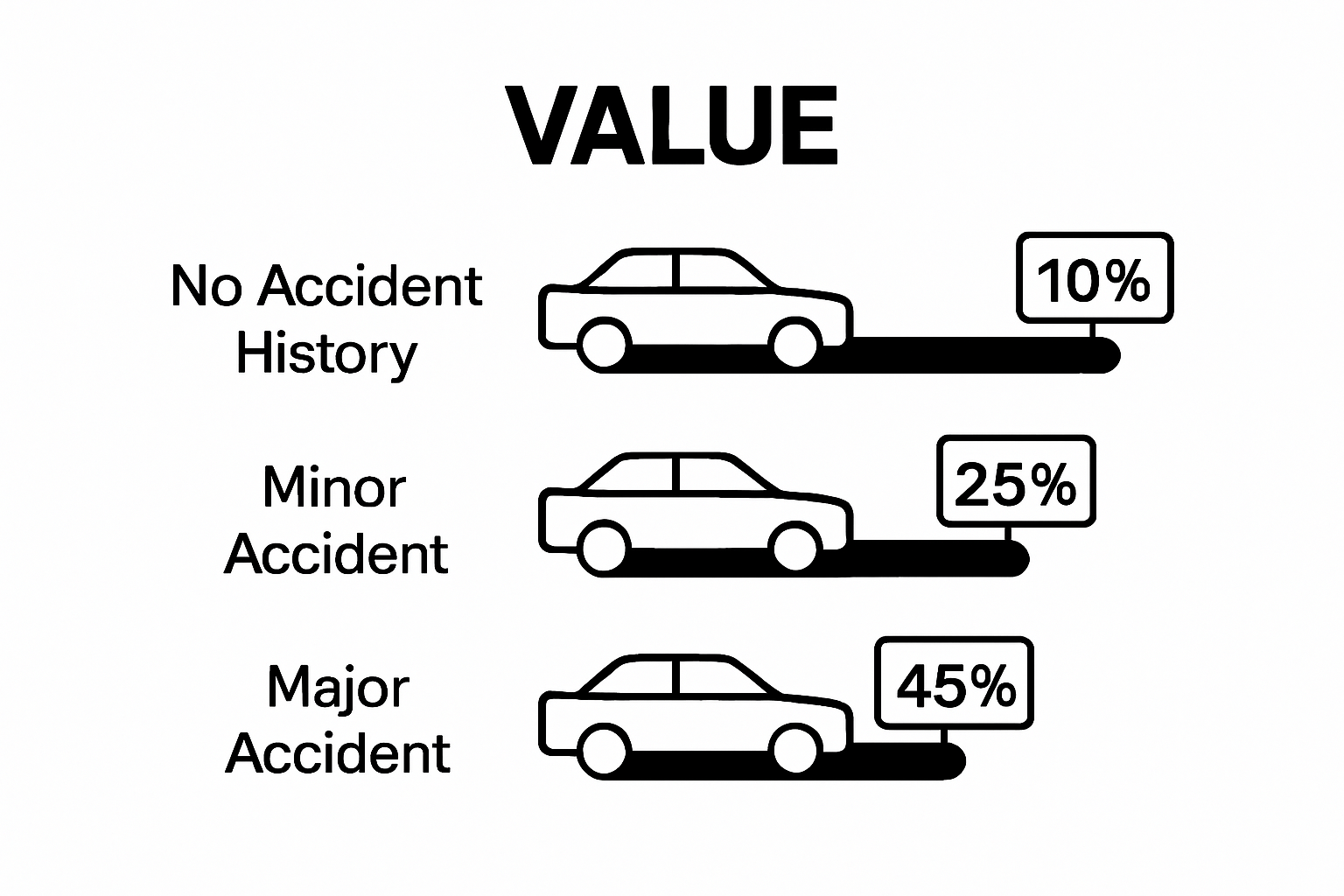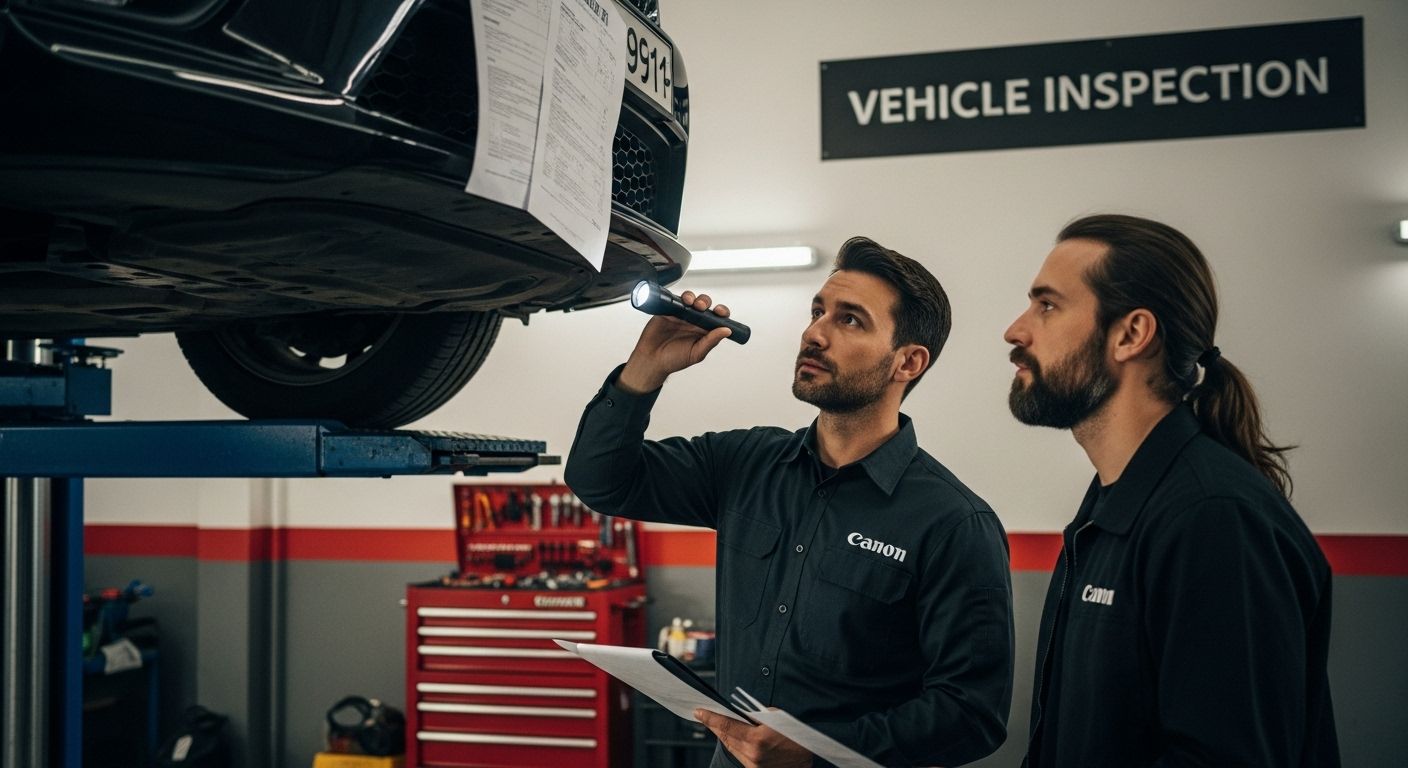Understanding Buying Cars with Accident History
August 29, 2025
Buying a car can feel like a smart way to stretch your dollar, and plenty of great deals pop up on models with previous accident history. Most shoppers get spooked at the idea, thinking a single incident means long term problems. Yet around 30 to 50 percent value drop can hit cars with substantial structural damage, opening up surprising opportunities for buyers who know what to look for. The real secret is that some of these vehicles—if carefully chosen and properly repaired—can deliver serious value and reliability others overlook.
Table of Contents
- What Does It Mean To Buy A Car With Accident History?
- Why Accident History Matters When Buying A Car
- How Accident History Affects Car Value And Safety
- Key Concepts To Consider About Cars With Accident Histories
- Real-World Implications Of Buying Cars With Accident History
Quick Summary
| Takeaway | Explanation |
|---|---|
| Understand the vehicle’s accident history | Always obtain a comprehensive vehicle history report before purchasing. It reveals important details about past damages and repairs. |
| Inspect for quality of repairs | Prioritize inspections focusing on structural integrity, paint consistency, and repair documentation to ensure reliability. |
| Evaluate financial implications | Cars with accident histories often have reduced resale values and potential higher insurance premiums. Factor these into your budget. |
| Seek professional evaluations | Professional mechanics can identify hidden damage and ensure that repairs were done correctly, safeguarding your investment. |
| Approach with informed caution | While an accident history doesn’t mean a car is a bad choice, careful evaluation and transparency are vital for a good investment. |
What Does It Mean to Buy a Car with Accident History?
Buying a car with accident history means purchasing a vehicle that has been involved in one or more incidents requiring significant repairs. This doesn’t automatically signal a bad investment, but it requires careful understanding and evaluation.
Understanding Vehicle History Reporting
When a car experiences an accident, insurance companies and vehicle reporting systems document these events. The Federal Trade Commission recommends obtaining a comprehensive vehicle history report before purchasing any used vehicle. These reports reveal critical information about past damages, repair work, and potential structural impacts.
Key Considerations When Buying Cars with Accident History
Not all accident histories are created equal. Some considerations include:
- Minor accidents with cosmetic damage might represent minimal risk
- Significant structural damage could compromise vehicle safety
- Proper professional repairs can restore a vehicle’s integrity
Buyers should pay close attention to detailed repair documentation and conduct thorough inspections. Learn more about vehicle reconstructions to understand how professionally repaired vehicles can offer excellent value.
Professional mechanics recommend checking:
- Consistent body panel alignment
- Paint color and texture uniformity
- Suspension and frame straightness
- Comprehensive repair documentation
Understanding a car’s accident history allows informed decision making. While past damage doesn’t automatically disqualify a vehicle, transparency and professional assessment are crucial in determining its current condition and future reliability.
Why Accident History Matters When Buying a Car
Accident history provides critical insights into a vehicle’s past performance, potential future reliability, and overall safety. Understanding the implications of a car’s accident record helps buyers make informed purchasing decisions.
The Safety and Performance Impact
A vehicle’s accident history reveals more than just surface damage. According to the Insurance Institute for Highway Safety, cars with previous accident involvement demonstrate higher risks of mechanical failures and safety system compromises. These underlying issues can significantly affect vehicle performance and driver safety.
Assessing Potential Long Term Risks
Cars with extensive accident histories present several potential long term risks:
- Structural integrity may be permanently compromised
- Repaired damage could lead to future mechanical breakdowns
Professional mechanics often recommend thorough inspections to understand the full extent of previous repairs. Investigate potential warning signs that might indicate inadequate or incomplete repair work.
Key evaluation points include:
-
Alignment and frame straightness
-
Quality and consistency of repair work
-
Potential hidden damage not immediately visible
While an accident history doesn’t automatically disqualify a vehicle, it demands careful scrutiny. Transparency and professional assessment are crucial in determining whether a car with previous damage represents a sound investment. Buyers should approach such vehicles with informed caution, understanding that each accident leaves a unique mechanical fingerprint.
How Accident History Affects Car Value and Safety
Accident history significantly impacts a vehicle’s market value, insurance rates, and overall safety profile. Understanding these complex dynamics helps buyers make informed purchasing decisions and assess potential risks.
Financial Implications of Vehicle Damage
A car’s accident history directly influences its market value. According to the Federal Trade Commission, vehicles with documented accident records typically experience substantial depreciation. Potential buyers and dealerships utilize vehicle history reports to evaluate and negotiate pricing.
Value Depreciation Factors
Several key factors determine how accident history impacts a vehicle’s value:

- Extent and severity of previous damage
- Quality of professional repair work
- Number of reported incidents
- Location and type of damage
Substantial structural damage can reduce a car’s value by 30% to 50%, making comprehensive accident history assessment crucial for budget-conscious buyers. Understand vehicle reconstruction strategies to make smarter purchasing decisions.
Key safety considerations include:
-
Potential compromise of original manufacturing integrity
-
Reduced effectiveness of safety systems
-
Long term mechanical reliability concerns
While accident history doesn’t automatically disqualify a vehicle, it demands careful evaluation. Buyers should prioritize transparent documentation, professional inspections, and comprehensive understanding of the car’s past to ensure both financial prudence and personal safety.
This table summarizes the main factors that influence a car’s value and safety when it has an accident history, as discussed in the article.
| Factor | Effect on Value | Effect on Safety |
|---|---|---|
| Extent/severity of damage | Major structural damage can reduce value by 30-50% | Can weaken frame or safety systems |
| Number of incidents | Multiple accidents typically accelerate depreciation | Repeated damage increases reliability concerns |
| Quality of repair work | High-quality, documented repairs may maintain more value | Proper repairs restore reliability/stability |
| Location/type of damage | Frame or structural area damage lowers value more than cosmetic | Structural areas critical to crash protection |
| Transparency/documentation | Clear records and repair proof help retain more value | Lets buyers verify integrity and repairs easily |
Key Concepts to Consider About Cars with Accident Histories
Understanding the nuances of vehicles with accident histories requires a comprehensive approach that goes beyond surface level evaluations. Buyers must develop a strategic framework for assessing potential risks and opportunities within these unique automotive scenarios.
Comprehensive Vehicle History Assessment
According to Consumer Reports, obtaining a detailed vehicle history report represents the foundational step in evaluating a car with previous accident involvement. These reports provide critical insights into:
- Documented accident details
- Repair documentation
- Previous ownership records
- Potential title complications
Critical Inspection Strategies
Professional mechanical inspections are non negotiable when considering vehicles with accident histories. Explore comprehensive vehicle safety techniques to make informed purchasing decisions.
Professional mechanics recommend examining several key indicators:
- Structural alignment precision
- Paint consistency and panel matching
- Suspension system integrity
- Electronic system functionality
- Underlying frame condition
Each vehicle with an accident history represents a unique case study. While some accidents result in minimal impact, others can compromise long term vehicle reliability. Buyers must approach these vehicles with a balanced perspective understanding that thorough investigation can reveal hidden opportunities beyond initial perceptions.

Real-World Implications of Buying Cars with Accident History
Purchasing a vehicle with an accident history extends far beyond the initial transaction, introducing complex practical and financial considerations that buyers must carefully navigate. Understanding these real world implications helps consumers make more informed and strategic decisions.
Insurance and Financial Considerations
Insurance companies approach vehicles with accident histories differently, which can significantly impact long term ownership expenses. Premiums may be higher for cars with documented damage, reflecting perceived increased risk. Some insurers might require additional documentation or comprehensive inspections before providing coverage.
Key financial implications include:
- Potential higher insurance rates
- Reduced resale value
- Potentially higher maintenance costs
- Complex financing negotiations
Safety and Performance Realities
Investigate potential vehicle reconstruction risks to understand the nuanced safety landscape. While many professionally repaired vehicles perform excellently, some may have underlying structural vulnerabilities that compromise long term reliability.
Critical performance considerations involve:
- Potential handling inconsistencies
- Reduced structural integrity
- Increased likelihood of future mechanical issues
- Compromised safety system effectiveness
Buyers must recognize that each vehicle with an accident history represents a unique scenario. Thorough research, professional inspections, and transparent communication with previous owners and mechanics can help mitigate potential risks and uncover hidden opportunities in these distinctive automotive investments.
Below is a comparison table outlining the potential risks versus potential opportunities of buying cars with accident histories, as described throughout the article.
| Potential Risks | Explanation | Potential Opportunities | Explanation |
|---|---|---|---|
| Compromised structural integrity | Major damage may weaken the vehicle frame and safety features | Significant value savings | Cars with prior damage can be purchased at 30-50% lower prices |
| Increased likelihood of mechanical issues | Previous damage could lead to ongoing repairs or hidden faults | Restored reliability with good repair | Properly repaired cars can be dependable if assessed and fixed well |
| Reduced resale value | Accident listings decrease market value and future sale price | More features for the money | Buyers may afford newer or higher-trim vehicles for less |
| Higher insurance rates | Insurers may charge more due to increased perceived risk | Potential for negotiation | Damage history can provide leverage to negotiate a better price |
| Potential hidden damage | Incomplete repairs or missed issues may cause future problems | Transparency from thorough inspection | Detailed reports and inspections can clarify a car’s true condition |
Discover the Transparent Way to Shop Rebuilt Title Cars
Feeling frustrated by the hidden risks and extra costs when considering cars with an accident history? You are not alone. This article highlights the time, money, and uncertainty buyers often face when sifting through incomplete vehicle records and guessing at a car’s true past. But what if you could skip the detective work and choose from cars with open, honest histories at your fingertips?

Put uncertainty in your rearview mirror. At ReVroom, every vehicle includes pre-repair photos and clear accident history details right in the listing. That means you save the average $150 per car spent on independent reports, make smarter decisions faster, and never buy blind. Check out our platform and see how transparency changes the game. Ready to rethink what’s possible with rebuilt titles? Explore listings now to find exceptional value and drive further with trust on your side.
Frequently Asked Questions
What does it mean to buy a car with an accident history?
Buying a car with an accident history refers to purchasing a vehicle that has previously been involved in one or more accidents requiring repairs. Understanding the nature of the accident and repairs is crucial for making informed decisions.
How does an accident history affect a car’s value?
A vehicle’s accident history can significantly reduce its market value, with some damages leading to depreciation of 30% to 50%. Buyers should assess the severity of past incidents and quality of repairs to understand their impact on value.
What should I check when inspecting a car with an accident history?
When inspecting a car with an accident history, key evaluation points include structural alignment, quality of repairs, paint consistency, and overall mechanical condition. Professional mechanical inspection is highly recommended for detailed analysis.
Is it safe to buy a car with previous accident damage?
While buying a car with previous accident damage isn’t automatically unsafe, buyers must approach such vehicles with caution. It’s essential to verify repairs, assess potential ongoing risks, and consider if the vehicle meets safety and performance standards.
